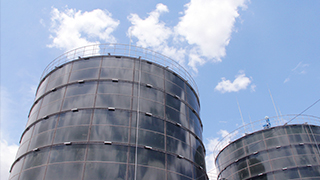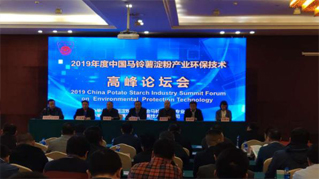"In the future, we wish to be the overall solution provider for urban and rural organic wastes, contribute to the resource and industrial development of urban and rural organic wastes in China, and become the first listed company of biogas project sector in China. This is our dream!" said Yin Jianfeng, Vice President of Marketing and General Manager of Project Division of Beijing Yingherui Environmental Technology Co., Ltd. (hereinafter referred to as "Yingherui"), at the just-concluded 18th IE Expo China when he was interviewed by E20 Environmental Platform. Yin also said that Yingherui keeps deepening in the field of biomass biogas, and is moving ambitiously towards the dream.

Yin Jianfeng, Vice President of Marketing & General Manager of Project Division of Yingherui
Fill the Domestic Gap and Rank Top in the Market Share of Enamel Assembled Tanks for Many Years
Founded in 2005, Yingherui is a state-level high-tech enterprise which has been long committed to the resource utilization of urban and rural organic wastes, environmental pollution control and clean energy production. The main business of Yingherui covers the integration of urban and rural organic waste treatment system, the research, development, manufacturing and sales of environmental equipment and the investment and operation of biomass biogas projects. After more than a decade of development, Yingherui has made a name for itself from a small company, sold more than 6,000 tanks in the world, completed nearly 300 projects and designed over 500 projects.
According to Yin, Yingherui's main business consists of two parts: the production and supply of complete sets of environmental equipment, and the general construction contracting of large-scale biogas projects. As for the complete sets of environmental equipment, the three major products are enamel assembled tank, bio-desulfurization system and membrane gas cabinet. "Among them, the enamel assembled tank has outstanding advantages in the industry. The company is the leading unit of drafting the industry standard of enamel assembled tanks. For many years, our enamel assembled tank has ranked top in terms of sales volume in China and has exported to Southeast Asia, Europe and other countries," Yin said proudly. Yingherui enamel assembled tank, made of special steel plate, features excellent anti-corrosion performance, easy, fast and safe installation, long service life and reasonable price; it is maintenance-free, removable, expandable and beautiful. The reporter learned that, after the enamel assembled tank is standardized by Yingherui, the reactor with a volume of 3,000 m3 probably only needs 5 to 6 workers to complete the installation in a week or so; 70% to 80% of the work can be done at the factory and after that, it can be delivered to the site for rapid assembly.
Yingherui is known to be the first enterprise engaged in the R&D and manufacturing of enamel assembled tanks. In 1999, the predecessor of Yingherui completed the first enamel assembled tank designed and manufactured by the Chinese people, which filled the gap in the domestic technology. Over the last 20 years, Yingherui has long ranked first in terms of domestic market share for enamel assembled tanks on the road of continuous innovation, improvement, adjustment and re-improvement, and become the leader of enamel assembled tank in China. At present, Yingherui has three advanced equipment production lines for enamel assembled tanks, with an annual output of 100,000 enamel steel plates.
In addition to the famous enamel assembled tank, the bio-desulfurization system is another highlight of Yingherui. Yin Jianfeng said that the bio-desulfurization technology is a patented technology owned by Yingherui after for many years of R&D. The technology utilizes desulfurization microorganisms to convert H2S in biogas into elemental sulfur or sulfate through biooxidation process, and at the same time provides the energy required for growth and metabolism of microorganisms. It has been successfully applied in several projects.

Yingherui Enamel Assembled Tank Exhibited on the 18th IE Expo China
Environmental Protection + Energy: Yingherui Rebuilds the Value of Organic Wastes
Mr. Qian Yi, an academician of the Chinese Academy of Engineering and a professor at the School of Environment at Tsinghua University, once commented on anaerobic technology that, "the technology is in line with the harmony idea. It does not waste resources and can turn wastes into resources. At present, China's rural sewage treatment calls for innovation. For example, anaerobic technology is a solution for straw problem. We can ferment the livestock manure and straw together to balance the water content and to produce agricultural fertilizer." Yingherui is an active practitioner of Mr. Qian's idea of "comprehensive utilization and turning waste into wealth".
Yin Jianfeng said that, China has a wide range of urban and rural organic wastes, including kitchen waste, urban organic sludge, livestock manure, crop straw and organic wastewater; these raw materials are complex in variety, large in quantity, wide in pollution and difficult to collect and supervise, and can cause a wide rang of hazards. Yingherui adopts an orderly collection and centralized treatment mode to generate clean energy and produce organic fertilizer while solving environmental pollution.
As a well-known company with proprietary technologies in the field of biomass biogas, Yingherui has maintained scientific research cooperation with well-known European technology companies over the years and developed a series of equipment and processes that are especially suitable for Chinese raw materials. For example, the ABDP anaerobic biomultiplication technology specific to low-concentration livestock manure in China allows the anaerobic system to obtain better microbial flora concentration, yield higher organic load, and improve the decomposition efficiency of organics for higher biogas output. For another example, the cellulose hydrolysis technology developed for fermented raw materials with higher cellulose content, such as green cornstalk, dry straw, wheat straw and rice straw, and the "green production line" of organic fertilizer can produce high-quality organic fertilizer rich in nitrogen, phosphorus, potassium, microelements and amino acids.
After years of technical R&D and project practice, Yingherui has formed a complete A-Z service chain integrating R&D, design, production, construction, commissioning and after-sales service in the field of large-scale biogas projects. Talking about the partners and representative projects of Yingherui, Yin had a very firm grasp, "we have taken charge of more than 300 large and small biogas projects. Currently, we are mainly focusing on several large-scale biogas projects of tens of thousands of cubic meters for the application in pig and cattle farms, straw and mixed raw materials. We have established long-term and stable cooperative relations with many group companies, such as COFCO, CNBM, Wings Group and Zhengbang Group." He continued, "Yingherui has cooperated with COFCO in five to six large projects, with the fermentation volume of more than 10,000 cubic meters. We have also cooperated with Tianjin Jialihe Group in 11 large dairy farm biogas power generation projects, and the largest is the 2MW biogas power generation project of 14,000 cow methane." According to Yin Jianfeng, Yingherui's business has covered all of China except Tibet and Taiwan.
Yingherui: The Biogas Sector Is in Urgent Need of Large-Scale and Market-oriented Development
At the 2017 Conference of Strategic Alliance for Technological Innovation of Sludge Treatment Industry, the chief partner of E20 pointed out that the sludge industry's way out lies in resource, capitalization and commercialization. This is similar with Yin Jianfeng's view on the development of biogas industry.
Talking about the challenges for the biogas industry, Yin Jianfeng said candidly that his experience in the biogas industry for more than a decade has brought him many feelings. In Yin's view, although China has been promoting biogas projects to solve the problems of rural pollution and clean energy utilization, from the perspective of biomass power generation and biogas purification projects, the firm prices of raw materials have led to the poor profit and limited scale of projects and the weak development of the industry due to the difficulties in collecting rural materials. In 2015, China proposed transformation and upgrading, and began to develop in a large-scale and market-oriented way and to introduce social capital. Yin said bluntly that, "this is the future development direction of the biogas industry". At the same time, he suggested the state to come up with corresponding incentives and subsidies as soon as possible for the healthy and stable development of the industry.
In January 2017, Yingherui obtained an investment of RMB 50 million from China Capital Management Co., Ltd., and the company, which has been focusing on internal cultivation for more than a decade, has won the capital for the new stage development. Yin Jianfeng believed that China Capital Management Co., Ltd. chose to cooperate with Yingherui for three reasons: 1) the irresistible trend. As the industry with great development potential in biomass energy, the biogas sector is now on the eve of outbreak while Yingherui, one of the top three in the industry in terms of biogas project performance, has great potential for rapid development in the future; 2) the elite team. Yingherui has a stable elite team mainly consisting of aggressive backbone born in 1980s, and they show a huge enterprise-driven potential; 3) Yingherui has proprietary technologies of anaerobic fermentation and biogas purification.
In addition to the capital injected, Yingherui has begun the overall layout of biogas investment and operation in line with the development trend of the industry. Yin said, "in the future, we will establish the distributed green energy stations, be committed to building the third-party livestock manure treatment mode for large-scale farms, and vigorously develop biogas projects thru cooperation or investment by combining with the social resources and capabilities of those farms. And only in this way can Yingherui go further."







